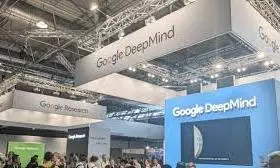
Google says its AI outperformed Math Olympiad gold medalists in Geometry
text_fieldsGoogle has announced a groundbreaking achievement in artificial intelligence, revealing that its latest AI system, AlphaGeometry2, has surpassed the problem-solving abilities of gold medalists at the International Mathematical Olympiad (IMO).
The AI system, developed by DeepMind, successfully solved 84% of complex geometry problems from past IMO competitions, outperforming the 81.8% success rate of average human gold medalists. Given the challenging nature of IMO problems, which require deep mathematical reasoning, this marks a significant advancement in AI’s ability to handle complex mathematical concepts.
Initially introduced in January last year, AlphaGeometry had performed at the level of IMO silver medalists. However, over the past year, Google has significantly enhanced the system’s capabilities.
To improve problem-solving accuracy, Google expanded AlphaGeometry's mathematical language, enabling it to tackle more intricate geometric problems that involve object movements, angles, ratios, and distances. "This enhancement increased AlphaGeometry’s ability to cover IMO geometry problems from 66% to 88%, significantly boosting its problem-solving range," Google stated.
Additionally, the company integrated its advanced Gemini AI tool to refine the system’s language modeling and search processes, further improving its efficiency.
One of the most notable upgrades allows AlphaGeometry2 to manipulate geometric objects dynamically. For instance, the AI can now move a point along a line to adjust a triangle’s height, or effectively solve linear equations—a capability that was previously limited.
Despite these impressive achievements, Google acknowledges that AlphaGeometry2 is not yet perfect.
"Our domain language still lacks the ability to handle problems involving a variable number of points, non-linear equations, and inequalities. Addressing these gaps will be crucial to achieving full automation in geometry problem-solving," DeepMind researchers explained.
Looking ahead, Google's long-term plan for AlphaGeometry2 is to achieve error-free, fully automated geometry problem-solving. The researchers also aim to speed up the AI’s inference process, making it even more reliable and efficient.























